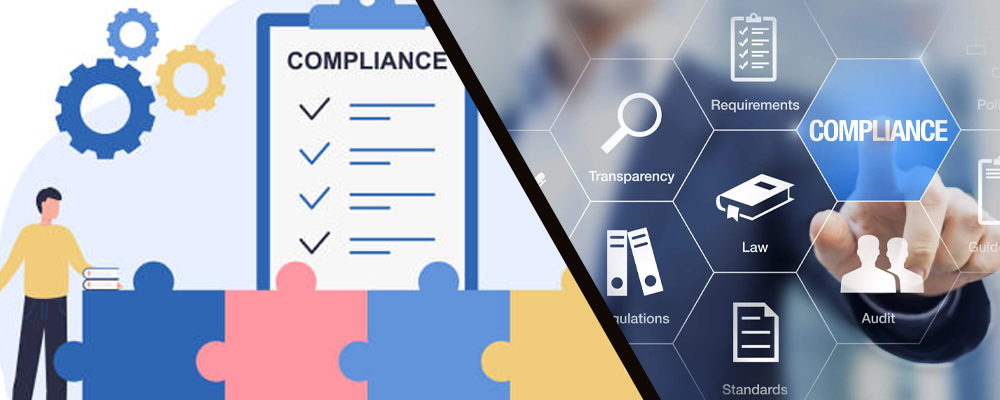“The action of complying with a directive” or “the state of satisfying norms or standards” are the definitions of compliance. It is described as the process of ensuring that your business and staff adhere to all rules, regulations, standards, and ethical practices that are relevant to your organization and industry in the business sector. The procedure for compliance ought to be continuing. Many businesses create software to correctly and consistently manage their compliance standards over time.
In other circumstances, compliance is required. Certain regulatory compliance duties, such as minimum wage laws or environmental, health, and safety rules, must be complied with by businesses. They must also adhere to regulations on the handling of sensitive data, such as credit cards and personally identifying information.
In the contemporary business environment, a compliance management system is crucial for helping an organization handle all of its compliance requirements. In addition to reputational problems that may drive away clients, staff, and business partners, breaking the law can result in serious legal challenges, fines, and even criminal prosecution.
Need A Legal Advice
The internet is not a lawyer and neither are you. Talk to a real lawyer about your legal issue

Importance:
Compliance will be crucial for recruiting, firing, employment discrimination, harassment, safety, salaries, payroll, and benefits as your business expands. Corporate compliance ultimately encourages ethical business practices, which results in a great work environment and a strong culture.
Compliance is significant because:
- It reduces the possibility of fines, penalties, strikes, legal action, or corporate closures.
- Measures for safety and security help avoid accidents, fires, and building evacuations that can cause downtime.
- Customers will trust you more if you comply with regulatory standards and optional certifications, which can strengthen your competitive edge.
- When workers are certain that they are working in a respectful, professional, and safe environment, their retention rates rise.
Creating corporate compliance program:
Few companies can afford to put off implementing a corporate compliance program. Don’t let your company’s hindsight be 20/20. Have the wisdom to act right away. To ensure that staff members are knowledgeable in all compliance-related topics, your programme should be carefully prepared, implemented, and accompanied by training initiatives.
Here are some actions you may do to create or improve your company compliance program:
Get the support of your leadership:
You must actively manage your corporate compliance program. The task of overseeing the program on a daily basis should fall under the purview of one individual. Your organization may have one compliance officer or numerous, depending on its size. No matter what, whomever is in charge of the compliance program ought to have the power to impose the rules and hold everyone accountable. They also require direct access to the company’s governing body, which could be either the board of directors or senior management.
Your leaders must first abide by the guidelines in order for the program to be successful. They ought to promote moral conduct and clearly discuss the significance of compliance. Employer involvement should be valued, and company executives should emphasize that reporting illegal or unethical activity won’t result in retaliation.
Risk Assessment:
You must be aware of the compliance areas that represent the most risks to your firm in order to develop a successful programme. You can concentrate your resources on addressing these issues once you have recognized them. Regulations from the federal and state governments as well as business standards are always changing. Conducting regular assessments is vital to reduce the risk of noncompliance. A risk assessment is advised to be done once per year, according to the Association of Corporate Counsel (ACC).
Establish and maintain your code of conduct:
You should design procedures to aid staff in following policies appropriately when risk areas have been identified and rules have been created. Making detailed instructions makes it simpler to follow processes and spot noncompliance. Risky places in some sectors might need higher criteria. For instance, the Foreign Corrupt Practices Act may mandate that you maintain elaborate procedures for vetting outside business partners.
Train Employees:
Standards and policies for compliance are pointless if personnel don’t adhere to them. You must inform each employee of the policies and processes for your business compliance programme after they have been established. Ensure that all compliance rules and procedures are read and approved by corporate officers, employees, and third-party vendors.
A chief compliance officer should be appointed by businesses to manage compliance requirements. To keep track of the various company compliance regulations, larger firms could maintain a compliance department. This division will keep an eye on every project, corrective action, and company compliance policy. A corporation should also use software with a database, according to best practices, to automatically track various compliance framework requirements and evaluate internal compliance performance.
Lead India provides you the assistance of expert lawyers in execution of maintenance orders passed by the court.





 Talk to a Lawyer
Talk to a Lawyer